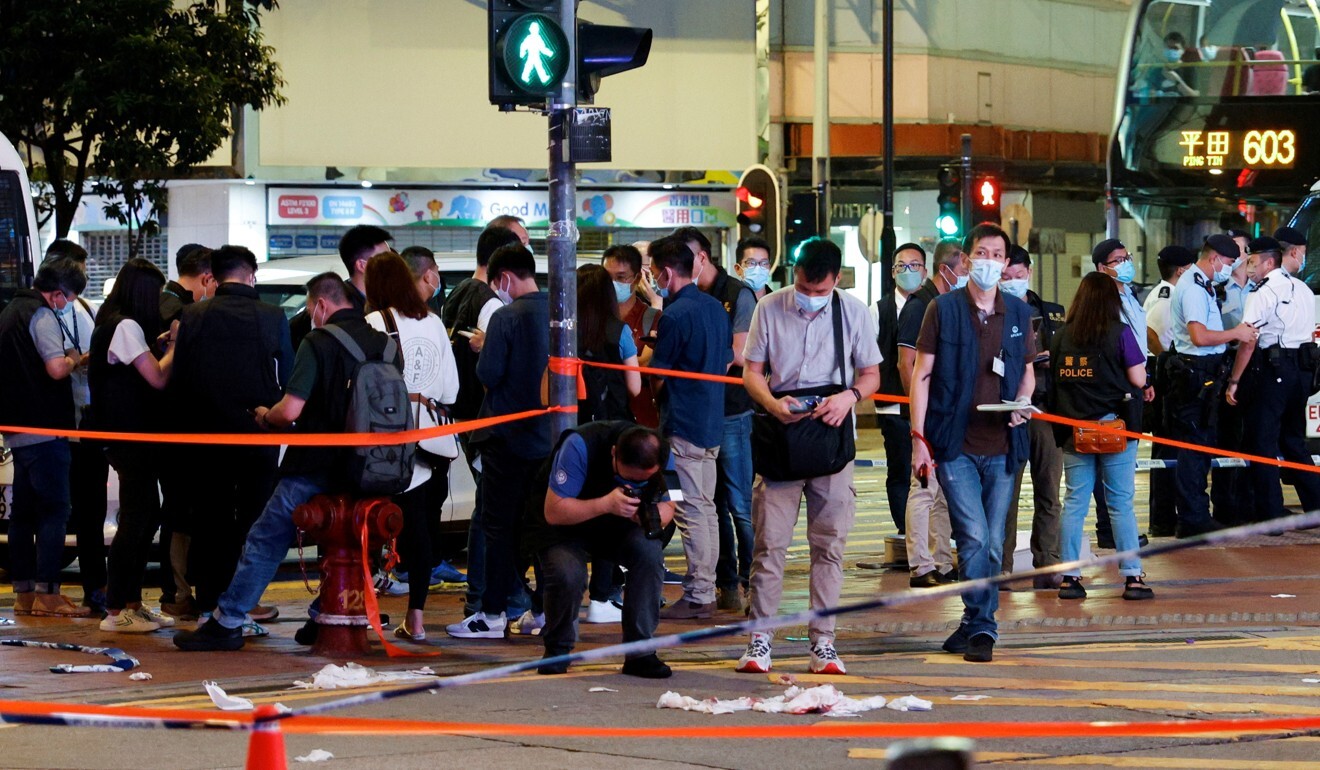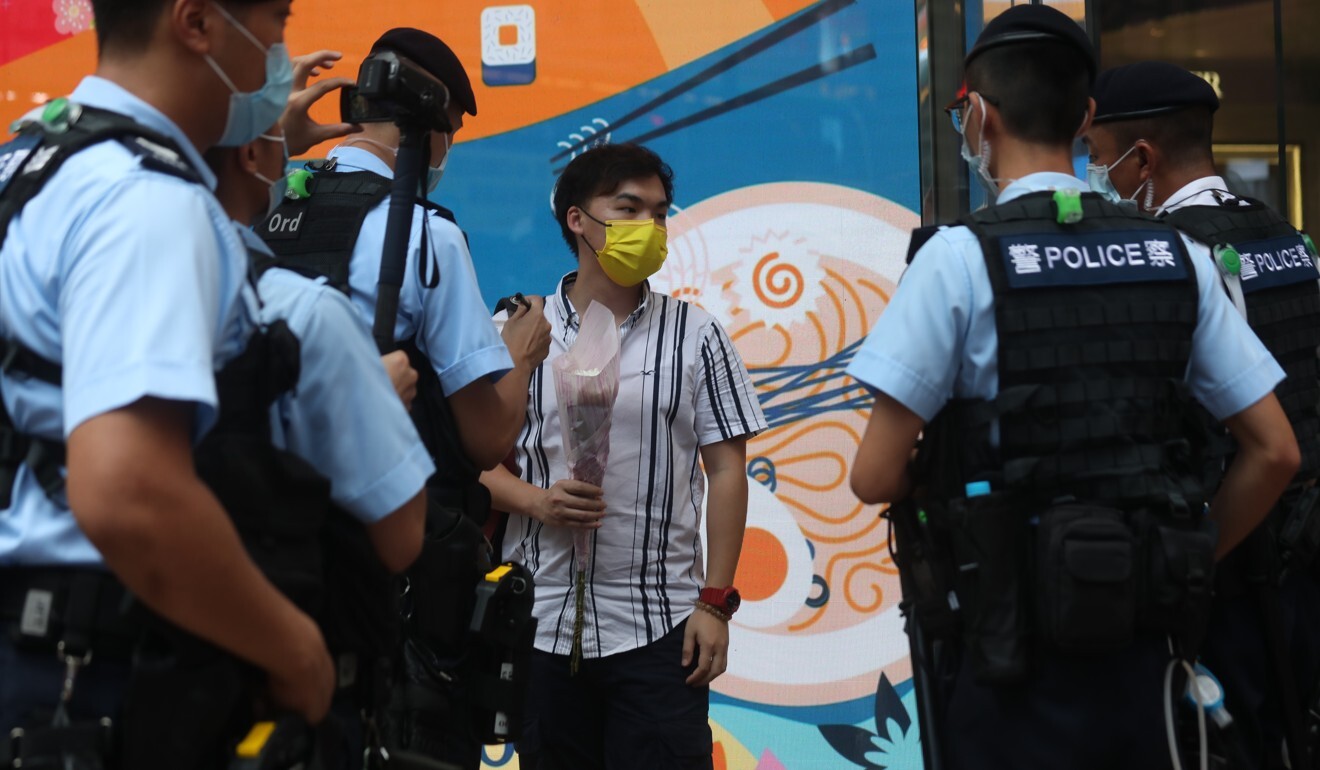
Hong Kong police arrest two suspected of inciting others via social media to commit murder, arson targeting officers
- Arrests come days after 50-year-old man stabbed police officer in back before fatally plunging knife into his own chest
- Police decline to say whether pair’s case is linked to July 1 attack, but note comments were posted a day after the incident
“The investigation is still under way, and police will not rule out further arrests,” said Superintendent Wilson Tam Wai-shun, who did not disclose the number of messages posted, but stressed the seriousness of their content.

The arrests came as police said on Sunday that a preliminary investigation suggested the assailant in the “lone-wolf” knife attack last week had been “radicalised by myriad fake information”.
Sunday’s arrests, however, were not made under the Beijing-imposed national security law, but rather under the city’s criminal code. The two stand accused of sedition, and inciting others to commit murder and arson.
Tam also noted a court injunction was in place forbidding threatening police officers and maliciously exposing their personal information – a practice known as doxxing.
Hong Kong faces tough questions over threat of domestic terrorism
In a televised interview on Sunday, former security minister and new Chief Secretary John Lee Ka-chiu warned of the dangers of people using their frustration towards the government to justify what police had dubbed an “act of domestic terrorism”, noting the potential for unpredictable copycat attacks.
“This time, it happened to a police officer. Next time it could happen to other citizens,” Lee said of the stabbing.
“Acts of terrorism should not be accepted by anyone. If we have problems, we talk it out.”
But the relative calm that day was shattered when the attacker stabbed a police officer in the back in Causeway Bay, puncturing his lung, before killing himself. As of Saturday morning, the officer was in a stable condition after undergoing two surgeries.
A police spokesman on Sunday said the case had been referred to the national security unit the day before, and urged people to come forward to provide information.
Political storm engulfs Hong Kong’s Vitasoy over memo about July 1 attacker
“Police’s initial investigation revealed that this was a lone wolf-style act of domestic terrorism in which the attacker was believed to have been radicalised by myriad fake information, but we will not rule out any possibilities,” he said, without revealing the nature of the material in question. He added the unit would look into whether the man was incited or supported by others.
Simon Young Ngai-man, a law professor at the University of Hong Kong, explained that prosecutors did not need to establish a message had directly led to an act to prove an incitement charge. As long as the author of the message had intended for the act to take place, and the perpetrator of the act had seen the message, that would be enough to constitute incitement.
“With the incitement offence, there need not be causation,” he said.
Incitement could also be prosecuted even if the crime being encouraged did not take place, Young added. The offending message only needed to be considered “reasonably capable of persuading someone to commit the act”, he said.

In his interview, Lee also said the government was still looking at ways to stymie the spread of so-called fake news – which it has blamed in part for the 2019 anti-government protests – including by prosecuting those who disseminated it under a law that was currently being considered.
Lee said authorities aimed to target offending content rather than platforms, but would not rule out the possibility of a licensing system for media outlets under the proposed legislation, saying: “I would not make any conclusion at this stage.”
Since Thursday’s attack, some residents have visited the location to lay flowers in memory of the assailant, and accused police of thwarting their commemorations by throwing away the tributes. Police have defended their approach, saying the acts incited further hatred.

New police commissioner Raymond Siu Chak-yee said on Sunday that he had noticed comments online calling for violence against officers over the past few days.
“Whether you are the one carrying out the attack, or whether you are just behind the scenes inciting others to commit such a serious case, it is a very serious act and we will resolutely take enforcement action,” he said.
Siu also explained the stabbing case had been taken over by national security police because it was being treated as an act of terrorism, while warning people not to glorify the attack or mourn the assailant.
“We cannot allow such behaviour because it aims to incite hatred against police and split up society,” he said. “These activities can also affect public security and public order.”
Hong Kong police on high alert after officer stabbing by ‘lone-wolf domestic terrorist’
Chief Secretary Lee on Sunday stopped short of saying such mourning was illegal, but denounced it as morally indefensible, adding those who took part disregarded the potential ramifications of endorsing acts of terrorism.
“One cannot underestimate [terrorism’s] ability to spread and proliferate,” he said, pointing to attacks overseas. “On a moral level, society should criticise its incorrectness.”
Responding to critics’ arguments that the government’s own missteps had given rise to the situation, Lee allowed there was room for the administration to improve, but urged the public to instead join in sensible discussions.
He added that local bodies such as district-level crime-fighting committees – which were given seats on the Election Committee under the overhaul – could help residents channel their views to the government.


